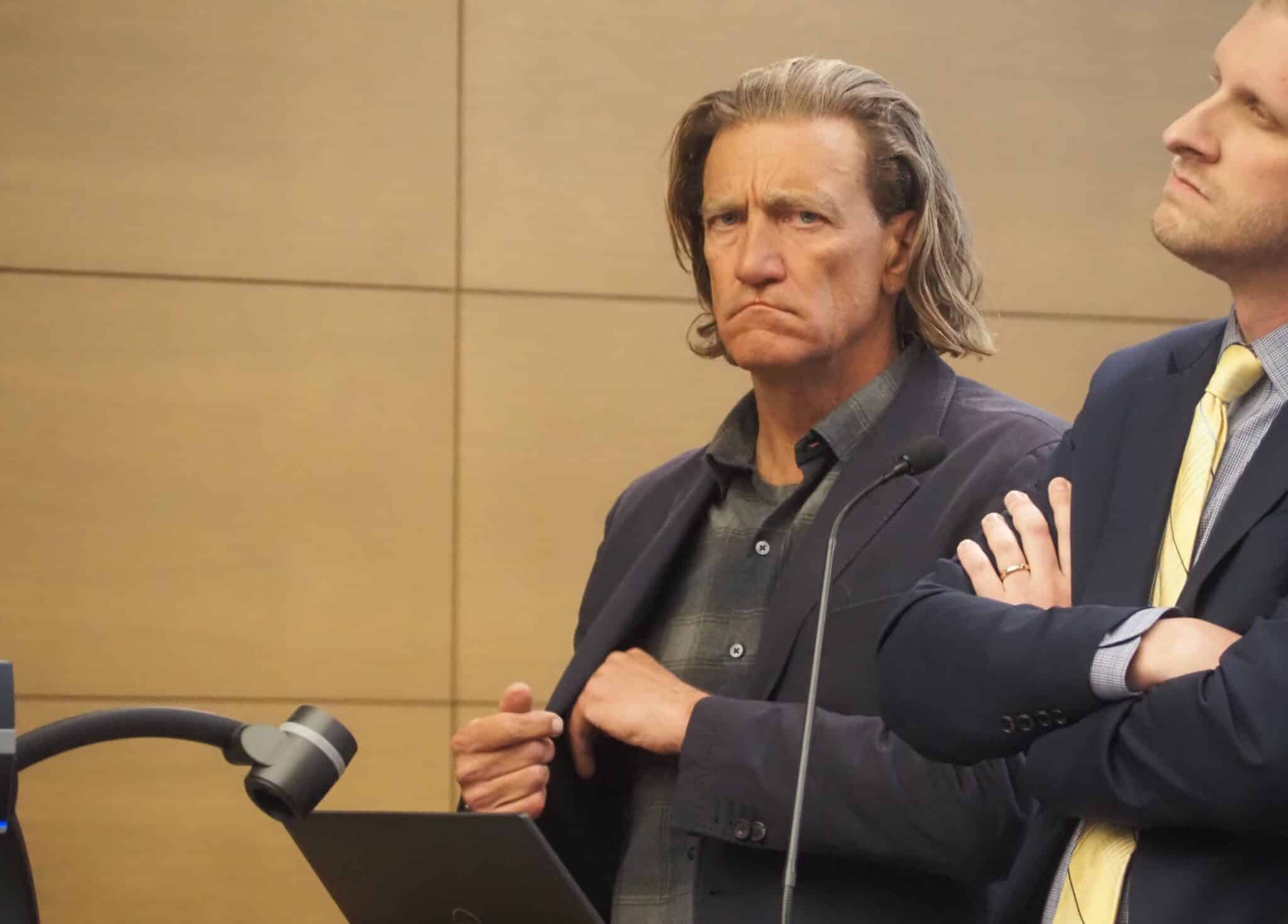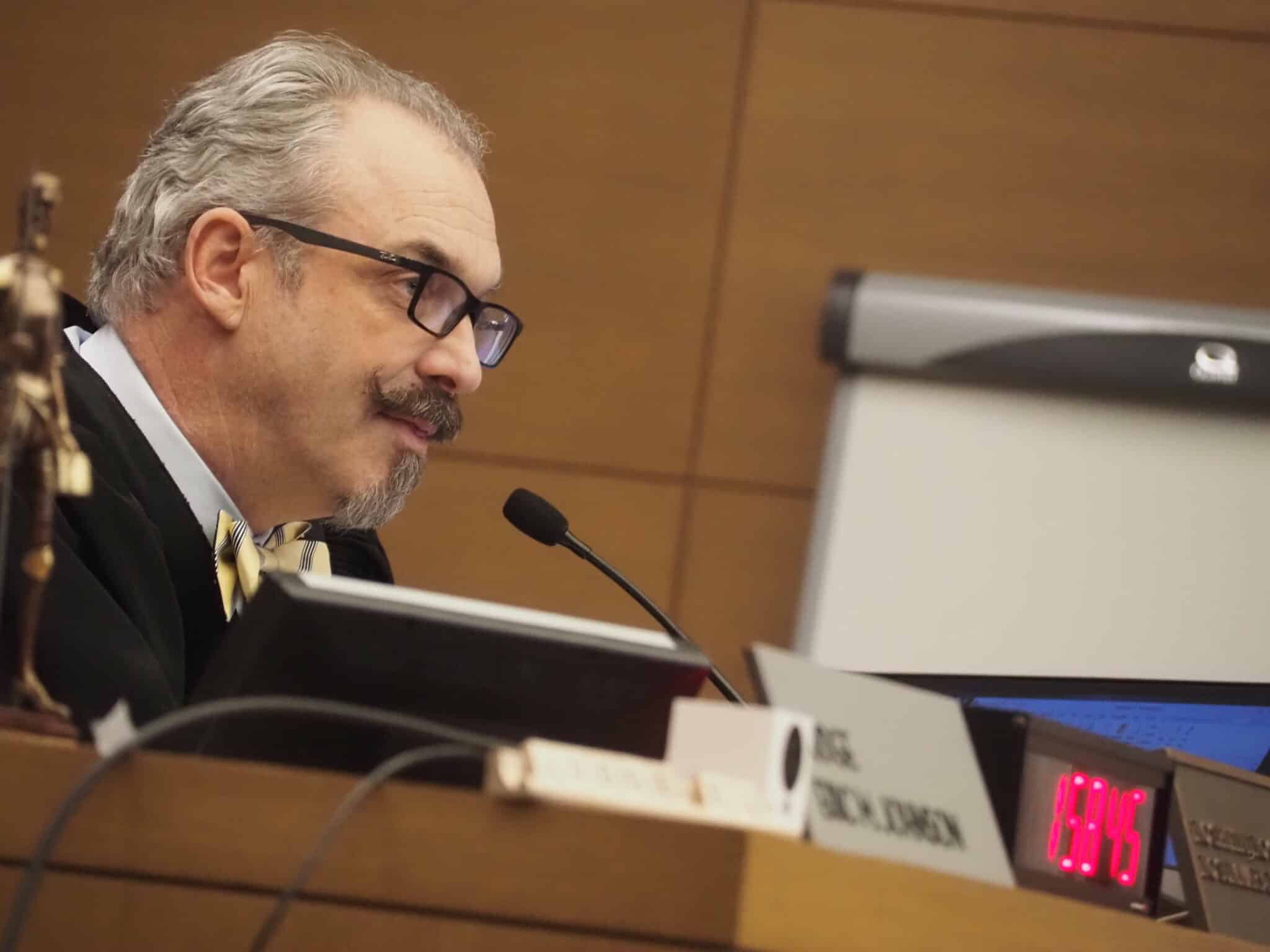
Steve Bachar, 57, eyes the crowd during a hearing in Denver District Court on Friday, March 10, 2023. (BusinessDen file)
For a second time in 10 months, Steve Bachar stood in a downtown Denver courtroom on Monday morning and admitted lifting money from a former friend. He also learned that $174,000 of his cash will not be returned but will instead go to an ex-wife and others.
Dressed casually in jeans and a button-down shirt with the sleeves rolled up, shoulder-length blonde hair tucked behind his ears, the 57-year-old dishonest businessman answered “Yes, your honor” time and again when asked whether he was sure he’d like to plead guilty. As part of a plea deal, he agreed to pay $182,808 in restitution at a Nov. 6 sentencing.
Bachar’s admission of theft, unlike an identical admission that he made in the same courtroom last November, is likely to result in prison time when he is punished in seven weeks.
“In October of 2017, Mr. Bachar solicited Jamie Lindsay, a longtime friend, for investments in Empowerment Capital, which was a company partly owned by Mr. Bachar,” Associate Deputy District Attorney Ashley Beck said Monday, as she read from their plea agreement. “Mr. Bachar offered Mr. Lindsay a 10-percent interest in Empowerment Capital’s profits.”
Lindsay initially invested $75,000 and later invested another $50,000. He also made eight personal loans to Bachar totaling $142,500 that were never paid back. Court records show that the North Carolina man has known Bachar since 1992, when they worked on Bill Clinton’s presidential campaign and then in the Clinton administration.
“Prior to Mr. Lindsay’s investments, Mr. Bachar misrepresented the risks associated with the investments (and) misrepresented his ability to sell interest in Empowerment,” Beck said.
“Mr. Bachar also admits that he intended to use Mr. Lindsay’s investment primarily for personal use and admits that his business partner was unaware of and had not consented to Mr. Lindsay’s investments in Empowerment Capital,” the prosecutor said.
“Is that what happened, sir?” Judge Eric Johnson asked Bachar when Beck was finished.
“Yes, your honor,” the defendant said.

Denver District Court Judge Eric Johnson listens to testimony during a sentencing hearing on Friday, March 10, 2023. (BusinessDen file)
When Bachar made that same admission last fall, it was part of a compromise with prosecutors. Under their agreement, Bachar paid $174,370 in restitution and prosecutors asked that he be sentenced to probation rather than prison time. Bachar paid the restitution in March but Johnson surprisingly rejected the plea deal because he considered it to be too lenient.
The case then moved ahead toward a late September trial, until last week, when Bachar and Beck reached another plea deal. This one leaves sentencing entirely up to Johnson. State guidelines call for 2-6 years in prison for the theft charge Bachar is guilty of.
Meanwhile, that $174,370 in rejected restitution has been battled over since March. On Monday, Johnson seemingly ended the debate when he ordered it to be returned to Bachar, which means it will be garnished by two people and two companies he owes money to in unrelated cases. Beck and Bachar had asked that it be used to pay restitution to Lindsay.
“Both motions are not factually accurate and they are not legally accurate,” Johnson said of last week’s requests by Beck and Bachar.
“The argument by defense counsel that he would somehow be paying restitution twice is meritless,” the judge added. “He paid money and it got taken by civil judgments on money that he owes to several people. He has not paid restitution once.”
After ignoring years of lawsuits against him, Bachar has been ordered to pay a total of $5.5 million to Future Health Co. in California (owed $3.8 million), DaVita (owed $700,000), local retiree Robert Hanfling (owed $271,000) and ex-wife Susan Bachar (owed $690,000). Those four will split Bachar’s former $174,370 as a result of Johnson’s order Monday.
“It’s not this court’s fault,” the judge said, “that Mr. Bachar owes money to other people.”

Steve Bachar, 57, eyes the crowd during a hearing in Denver District Court on Friday, March 10, 2023. (BusinessDen file)
For a second time in 10 months, Steve Bachar stood in a downtown Denver courtroom on Monday morning and admitted lifting money from a former friend. He also learned that $174,000 of his cash will not be returned but will instead go to an ex-wife and others.
Dressed casually in jeans and a button-down shirt with the sleeves rolled up, shoulder-length blonde hair tucked behind his ears, the 57-year-old dishonest businessman answered “Yes, your honor” time and again when asked whether he was sure he’d like to plead guilty. As part of a plea deal, he agreed to pay $182,808 in restitution at a Nov. 6 sentencing.
Bachar’s admission of theft, unlike an identical admission that he made in the same courtroom last November, is likely to result in prison time when he is punished in seven weeks.
“In October of 2017, Mr. Bachar solicited Jamie Lindsay, a longtime friend, for investments in Empowerment Capital, which was a company partly owned by Mr. Bachar,” Associate Deputy District Attorney Ashley Beck said Monday, as she read from their plea agreement. “Mr. Bachar offered Mr. Lindsay a 10-percent interest in Empowerment Capital’s profits.”
Lindsay initially invested $75,000 and later invested another $50,000. He also made eight personal loans to Bachar totaling $142,500 that were never paid back. Court records show that the North Carolina man has known Bachar since 1992, when they worked on Bill Clinton’s presidential campaign and then in the Clinton administration.
“Prior to Mr. Lindsay’s investments, Mr. Bachar misrepresented the risks associated with the investments (and) misrepresented his ability to sell interest in Empowerment,” Beck said.
“Mr. Bachar also admits that he intended to use Mr. Lindsay’s investment primarily for personal use and admits that his business partner was unaware of and had not consented to Mr. Lindsay’s investments in Empowerment Capital,” the prosecutor said.
“Is that what happened, sir?” Judge Eric Johnson asked Bachar when Beck was finished.
“Yes, your honor,” the defendant said.

Denver District Court Judge Eric Johnson listens to testimony during a sentencing hearing on Friday, March 10, 2023. (BusinessDen file)
When Bachar made that same admission last fall, it was part of a compromise with prosecutors. Under their agreement, Bachar paid $174,370 in restitution and prosecutors asked that he be sentenced to probation rather than prison time. Bachar paid the restitution in March but Johnson surprisingly rejected the plea deal because he considered it to be too lenient.
The case then moved ahead toward a late September trial, until last week, when Bachar and Beck reached another plea deal. This one leaves sentencing entirely up to Johnson. State guidelines call for 2-6 years in prison for the theft charge Bachar is guilty of.
Meanwhile, that $174,370 in rejected restitution has been battled over since March. On Monday, Johnson seemingly ended the debate when he ordered it to be returned to Bachar, which means it will be garnished by two people and two companies he owes money to in unrelated cases. Beck and Bachar had asked that it be used to pay restitution to Lindsay.
“Both motions are not factually accurate and they are not legally accurate,” Johnson said of last week’s requests by Beck and Bachar.
“The argument by defense counsel that he would somehow be paying restitution twice is meritless,” the judge added. “He paid money and it got taken by civil judgments on money that he owes to several people. He has not paid restitution once.”
After ignoring years of lawsuits against him, Bachar has been ordered to pay a total of $5.5 million to Future Health Co. in California (owed $3.8 million), DaVita (owed $700,000), local retiree Robert Hanfling (owed $271,000) and ex-wife Susan Bachar (owed $690,000). Those four will split Bachar’s former $174,370 as a result of Johnson’s order Monday.
“It’s not this court’s fault,” the judge said, “that Mr. Bachar owes money to other people.”
